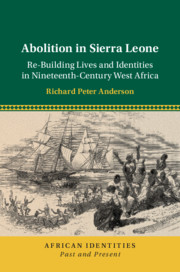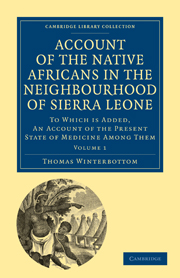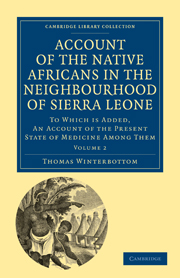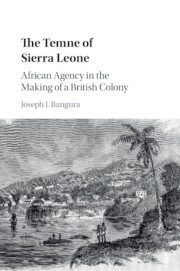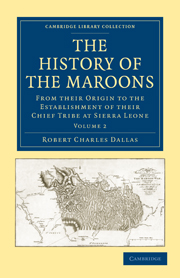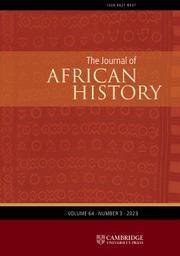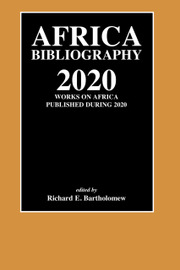Abolition in Sierra Leone
Tracing the lives and experiences of 100,000 Africans who landed in Sierra Leone having been taken off slave vessels by the British Navy following Britain's abolition of the trans-Atlantic slave trade, this study focuses on how people, forcibly removed from their homelands, packed on to slave ships, and settled in Sierra Leone were able to rebuild new lives, communities, and collective identities in an early British colony in West Africa. Their experience illuminates both African and African diaspora history by tracing the evolution of communities forged in the context of forced migration and the missionary encounter in a prototypical post-slavery colonial society. A new approach to the major historical field of British anti-slavery, studied not as a history of legal victories (abolitionism) but of enforcement and lived experience (abolition), Richard Peter Anderson reveals the linkages between emancipation, colonization, and identity formation in the Black Atlantic.
- A new approach to a major field of the history of British anti-slavery, studied not as a history of legal victories (abolitionism) but of enforcement and lived experience (abolition)
- Unites two major historiographical fields within the history of colonial Africa and of the African diaspora
- Explores the linkages between emancipation, colonization, and identity formation in the Black Atlantic
Reviews & endorsements
‘In this captivating volume, Richard Peter Anderson, tells a story of despair and hope. Centering the narrative around the experiences of Liberated Africans in the British colony of Sierra Leone, Anderson masterfully brings his subjects of study back from oblivion, in what it is by all means a thoroughly researched and wonderfully written text.' Manuel Barcia, University of Leeds
‘A welcome addition to a growing scholarship on Sierra Leone and the fate of Liberated Africans, whose lives were shaped by displacement, uprooting, and exploitation. Engaging in debates on colonialism, imperialism, and slavery afterlives, it is a must read for scholars working on slavery and the Atlantic World.' Mariana P. Candido, University of Notre Dame, Indiana
‘This work will quickly become the standard secondary source on the origins, experiences, and identities of the nearly 100,000 recaptive Africans removed from slave ships and barracoons and then taken into Sierra Leone in the first half of the nineteenth century.' David Eltis, Emory University, Atlanta
‘Richard Peter Anderson's masterful study of ethnicity and ethnogenesis among the recaptives of Sierra Leone is not only an original study of liberated Africans, but a major contribution to our understanding of the fluid nature of identities.' Martin Klein, University of Toronto
‘Meticulously researched and clearly written, this compelling book reconstructs the origins, experiences, and accomplishments of the approximately 100,000 Africans who were enslaved in the nineteenth century and liberated in Freetown, Sierra Leone as part of the project of abolition. The work shows how through their interactions with one another, missionaries, and British colonial officials the members of this large, diverse, and unusually well documented diaspora resilient forged new communities of belonging in an alien environment where they were granted only limited freedom. It yields rich new insights into the meanings of ethnicity, formation of new identities, and making of the African diaspora on the continent and around the Atlantic. A blend of macro - and micro - history, the text will become a classic.' Kristin Mann, Emory University, Atlanta
‘Abolition in Sierra Leone is a substantial contribution to the rethinking of identity and community formation among Africans who disembarked in Sierra Leone, a British colony, between 1808 and 1863, following the end of the slave trade … Anderson uses the Transatlantic Slave Trade Database, court records, and the Liberated African registers from Sierra Leone’s archives to explore the history of the trauma of enslavement and the brutality of the Middle Passage … Although their welcome was far from warm, the narratives from the registers demonstrate that this new wave of involuntary migrants contributed to a vibrant and evolving set of African identities that remade the colony of Sierra Leone … Highly recommended.’ C. Higgs, Choice
Product details
March 2020Hardback
9781108473545
306 pages
235 × 156 × 19 mm
0.6kg
3 b/w illus. 3 maps 12 tables
Available
Table of Contents
- Introduction. Sierra Leone: African colony, African diaspora
- 1. Liberated African origins and the nineteenth century slave trade
- 2. Their own middle passage: voyages to Sierra Leone
- 3. 'Particulars of disposal': life and labor after 'liberation'
- 4. Liberated African nations: ethnogenesis in an African diaspora
- 5. Kings and companies: ethnicity and community leadership
- 6. Religion, return, and the making of the Aku
- 7. The Cobolo War: Islam, identity, and resistance
- Conclusion. Retention or renaissance? Krio descendants and ethnic identity
- Appendices. A. 'Nations' of children in CMS school rosters by probable coastline of embarkation, 1816–1824
- B. 1848 Sierra Leone census
- C. Koelle's Aku informants
- D. Liberated African memorials in Freetown churches
- Select bibliography
- Index.

